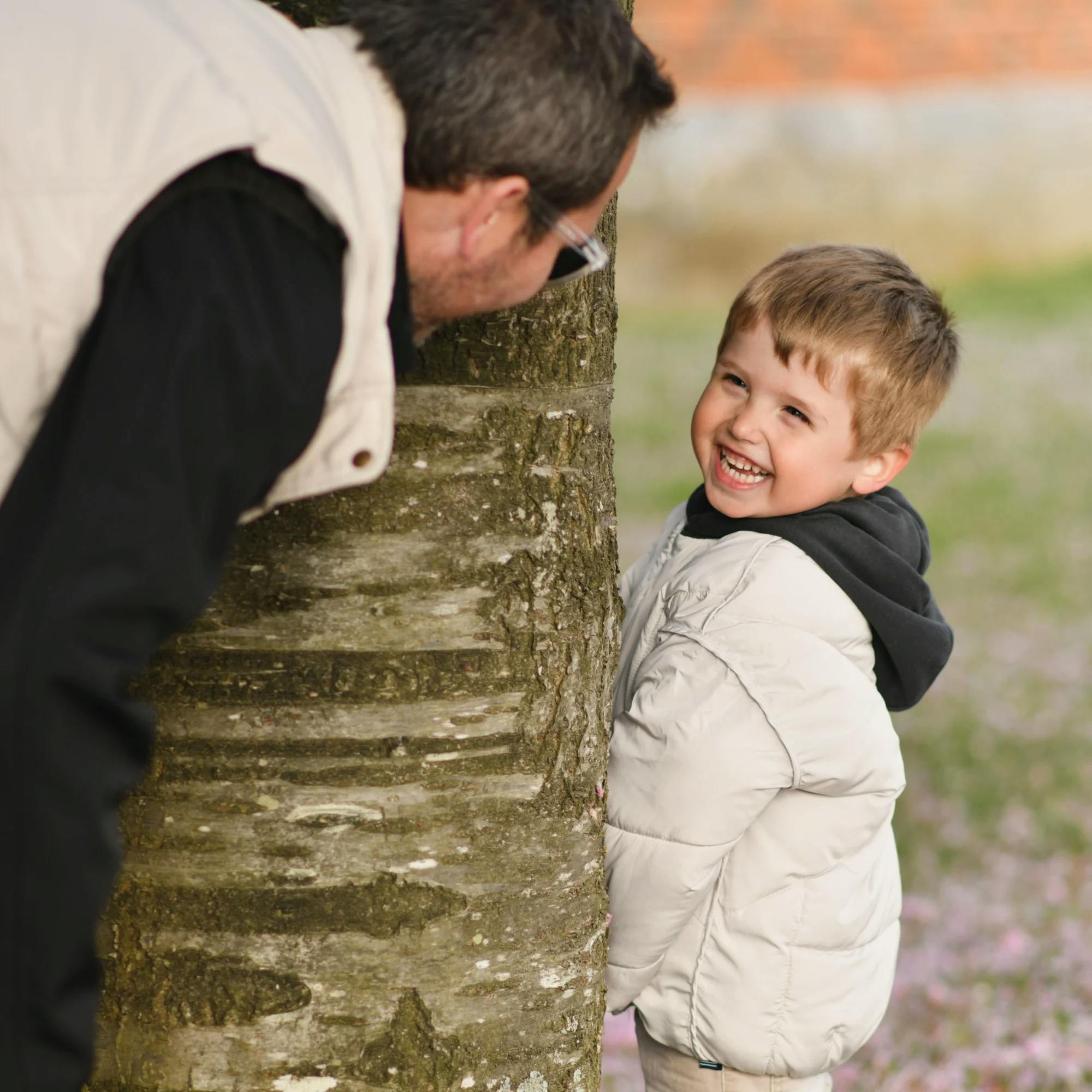
5 Speech Therapy Games for Toddlers and Preschoolers
 Abby Barnes, M.S., CCC-SLP
Abby Barnes, M.S., CCC-SLP
When you’ve got a little one at home, it’s not always easy to think of new activities and games to play together. Sometimes you just run out of ideas (and energy!).
And if your child is in speech therapy, when it comes to practicing their speech and language at home, you really need to find some fun and motivating speech therapy games.
When work feels more like play, everyone is happy. That’s why polled our speech-language pathologists to see which speech therapy games and activities they like to use with young kids and preschoolers. Here’s what they said.
Curious or concerned?
Our free screener is tailored by age and covers all areas of speech, language, and feeding. Find out if your child might need speech therapy.
 Screener for children
Screener for children1. Touch and feel (and talk!) activities
Alexis Irazoque, M.S., L/SLP, a speech therapist at Expressable, loves to use touch and feel activities. This game is great for helping your child practice saying new words and growing their vocabulary. You can easily change it up each time you play it, which keeps it exciting! Take a box, a bag, or any container that your child can’t see into. Grab some items from around the house to place inside. For example, you might add a small stuffed animal, Play-Doh or slime, an apple, a ball, a toy car, and a hairbrush. Place each item in the container one by one, without your child seeing. Then have your child reach in, feel the item, and guess what it is. To target speech and language skills, they can try to describe what they feel by using words like “cold,” “soft,” or “scratchy.” You can also help your child guess by giving them clues about each item. For example, “We use this to comb your hair,” or “This is one of your favorite snacks.” Bonus tip: It’s OK to throw some items in the box that your child doesn’t know the name of. This helps them learn even more!


2. Freeze dance for speech therapy
Who doesn’t love freeze dance? Your toddler or preschooler likely will! Sydney Nygaard, M.A., CCC-SLP, says, “Turn on some of your kiddo’s favorite music and dance together. Depending on your child’s age, you can vary this game slightly to work on different speech and language skills.” Here’s how she recommends playing. For toddlers or kids working on more basic vocabulary, use words like “stop” and “go” throughout the game. Explain that when you say “Stop,” your child should stop dancing and stand completely still. You can show them what you mean to help them understand. Then go on to explain that when you say “Go!,” they can start dancing again. This helps them learn the meaning of these words. And if they aren’t already saying these words, they may begin to use them, as well! So cue up the music and dance together. Say “Stop!” and “Go!” throughout the song. For preschoolers, feel free to use the word “freeze” each time you want them to stop dancing. You can even say words that rhyme with “freeze” to work on their listening abilities and word discrimination skills. You might try saying “Cheese!” or “Keys!” Your child will be anticipating the word “freeze,” so they’ll really have to listen to your words before moving. Bonus tip: Check out this kid-friendly video for an example of how to play this game.

3. Movement and physical games for speech therapy
Never underestimate how much kids enjoy physical games that involve moving their bodies. Marissa Silva, M.S., CCC-SLP, says these can be simple activities like having a tickle fight, giving a piggyback ride, having a race, or building an indoor fort. Silva explains, “Children love spending time with their caregivers. The one-on-one attention you give them during these activities—not to mention how much fun they are—can help your child in different areas of speech and language development.” Let’s look at some speech skills you can target during these games:
Tickle fight: This is a perfect activity for children learning to talk. They can request “more” or “stop” by saying the words themselves, imitating after you, or even making a sign! They may ask for “more” tickles but quickly say “Stop!” when it’s just too much. The giggles and smiles from your little one will make this a favorite game to play!
Piggyback rides: Most kids love a piggyback ride. You can work on having your child use single words to request what they want, like “up.” For older children, you can focus on sentence structure and length, such as, “I want a piggyback ride.”
Having a race: Racing each other is a helpful way to practice verbs. You can have one race where you run, one where you skip, one where you spin to the finish line, or maybe even one where you roll! For younger children learning to talk, you can work on naming the verb in the race you just completed and using it in small phrases, such as, “We run!” or “I skip!” For older preschool children, you can work on using the right verb tense, such as “We ran a race” or “I skipped to the finish line” for past tense. You can also practice present tense: “I am skipping.”
Building a fort: This is a good opportunity to work on spatial concepts. You can say things like, “Go in the fort,” “Stand behind the fort,” or “Put the pillow on top.” See how well your child can follow these directions. It’s OK if you need to help them out.
4. Speech therapy scavenger hunt
Irazoque recommends another speech therapy game: scavenger hunts. She says, “What’s great about a scavenger hunt is that you can play indoors or out! Give your preschooler some clues about items to find. You can make the clues as easy or as hard as you want, depending on your child’s age and ability.”
You may say something like, “Go find something that keeps us warm.” Your child may find a blanket or a coat. If you’re outside on a scavenger hunt, you can give your child clues to find items like sticks, leaves, or flowers. For children practicing speech sounds, have them look for items that use their target sounds. For example, if your child is working on the /k/ sound, they can practice saying that they found a “rock.” Or if they’re working on the /b/ sound, they can practice saying they found a “bug.” You can also practice receptive language tasks with your child, such as identifying items or following directions. Ask your kiddo to find the “hose” or pick the “flower.” Or work on following single- or multi-step directions. Give a direction such as “Pick up the ball,” or “Pick up the ball and then put it by the door.” See how easily your child can follow these directions. Bonus tip: If your child needs a little help following verbal directions, try repeating them or gesturing (such as pointing) to show your child what you mean.
5. I Spy for speech practice
Nygaard loves the classic game I Spy. “A beloved game like this can be easily repurposed for speech therapy practice!” she explains. “As you and your child find items to ‘spy,’ you can focus on whatever goals are most helpful for their speech development.” For instance, if your child is working on a speech sound, practice “spying” items that begin with or have the target sound in the word. For example, if your child is working on the /s/ sound, you can prompt them to find the “slide” or the “spoon.” If your child is learning to imitate phrases or use phrases on their own, they can practice saying “I spy…” over and over. Repeating a familiar phrase like this, and simply adding one new word each time, is a great way to practice. As you can see, speech therapy games and activities at home don’t have to be anything elaborate. The key is finding a game that will interest your child, then working your child’s specific goals into the activity. The more fun they’re having, the more practice they’ll complete. Plus, the two of you are enjoying one-on-one time together. That’s a win for everyone!
Online speech therapy for toddlers and preschoolers
If your child needs support with their speech, there are lots of benefits to online speech therapy. At Expressable, families appreciate the convenience of having sessions at home, where kids feel more comfortable. Teletherapy also makes it easier for parents to join in, and research shows that parent involvement is directly linked to kids making faster progress.

Several studies comparing in-person and telepractice speech therapy among toddlers have found that telepractice led to equivalent or higher scores on language assessments. In addition, both groups had high satisfaction scores from families.
Researchers also found that young children are generally engaged in online therapy—often better than parents might expect! Expressable speech therapists know how to use fun games and activities to keep your child interested during sessions. They’ll also coach you on exactly how to help your child at home, with lots of easy practice ideas shared in your client portal.
So don’t wait—get in touch with us today! We’re here to help your child become the communicator they were made to be.
Frequently asked questions (FAQs)
What are the best games for speech therapy?
Simple games that can easily incorporate language are best. Examples include freeze dance, scavenger hunts, and I Spy. They’re all simple, fun activities that motivate your child to practice speech skills at home.
Do I need to buy special games or materials to practice speech therapy at home?
Nope! It doesn’t take lots of supplies or complicated activities to help kids practice their speech and language. Simple games work, as well as natural conversations you have with your child every day, like during mealtimes, riding in the car, and at bedtime.
How can I learn how to help my child with their speech at home?
Home practice is key to helping kids learn to communicate. A speech therapy evaluation can identify what your child needs to work on and how best to help them at home. Get matched with an Expressable speech therapist to schedule an online evaluation. Your speech therapist will design a treatment plan that’s customized to your child, their needs, and your home life.
Key takeaways
Fun, simple speech therapy games are easy to play and keep your child motivated to practice.
You can adapt different speech therapy games to focus on what your child needs to practice.
A speech therapist can share guidance and ideas for home activities that are tailored to your child’s needs.
How Expressable Can Help
Concerned your child isn't reaching age-expected milestones? Looking for communication support from a professional? Expressable is a national online speech therapy practice serving children and adults. We treat all major areas of communication and feeding, offer flexible hours including evenings and weekends, and accept most major health insurance plans. We’re proud to have earned more than 3,000 5-star reviews from our clients (4.9/5 average).
Our therapy model is centered on parent and caregiver involvement. Research proves that empowering caregivers to participate in their loved one’s therapy leads to better outcomes. That’s why we combine live, 1-on-1 speech therapy with personalized education and home practice activities for faster progress.
Communication is more than words. It’s how we share how we feel and show who we are. We’re here to help you or your child do just that.








